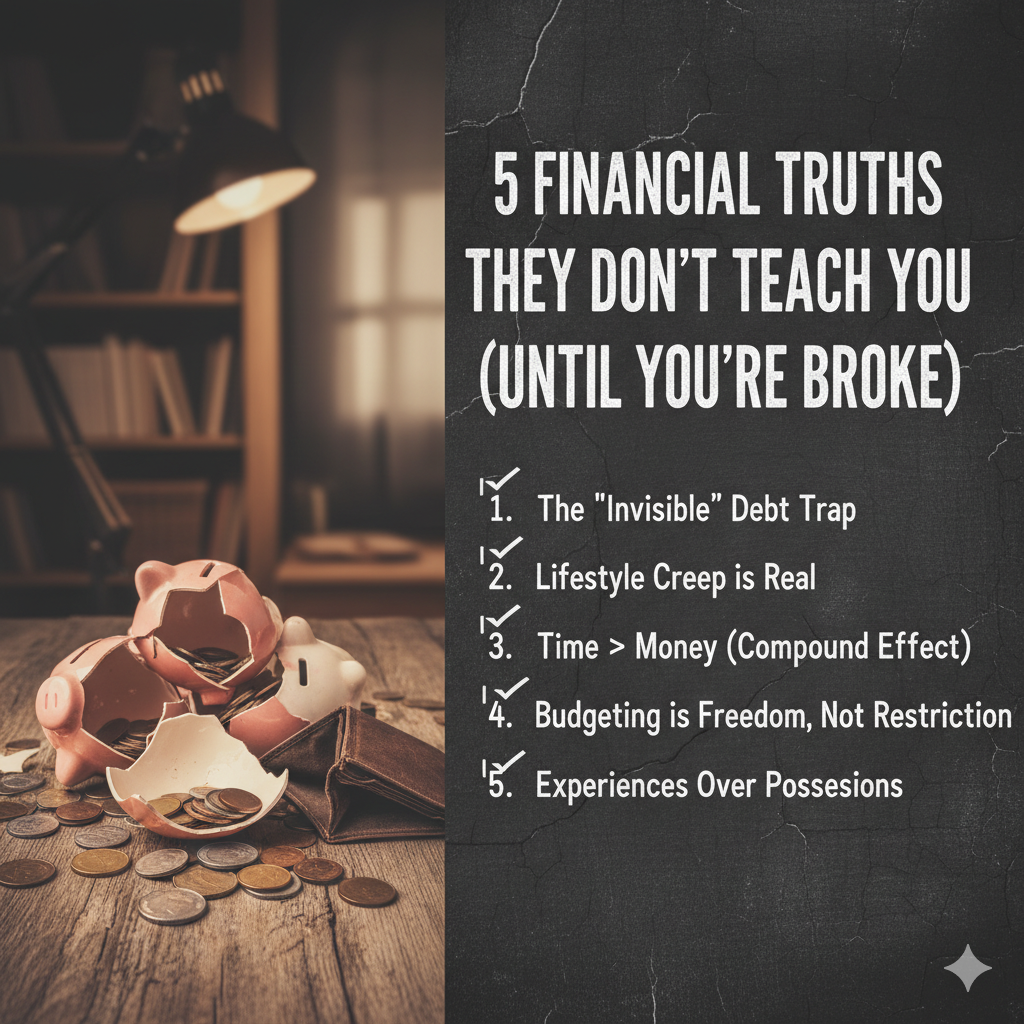Listen to this post: 5 Financial Truths They Don’t Teach You (Until You’re Broke)
Introduction: The Paycheck-to-Paycheck Puzzle
You work hard, you hustle, you do everything you’re supposed to do, but somehow, you’re still asking yourself by the 15th, “Wait, where exactly did my money go?” It’s a frustratingly common feeling: your bank account starts the month full of hope but is gasping for air by mid-month.
Most financial advice sounds simple enough: “earn more” or “make a budget.” But if it were that easy, millions of people wouldn’t be stuck in a cycle of financial stress. The truth is, these solutions often fail because they don’t address the core problem. The real reasons your money seems to disappear are often hidden in the blind spots of human psychology. This article explores the surprising behavioral truths that can help you finally gain real financial control.
1. Your Brain Is Sabotaging Your Debt Payoff Plan
High-interest debt from credit cards and payday loans can feel like an anchor dragging you down. When you decide to fight back, you’re usually presented with two strategies in a battle between logic and emotion.
- The Debt Avalanche: This is the cold, hard, rational path. You list debts by interest rate and attack the highest-rate debt first. From a “strictly financial perspective,” this method is stronger because it saves you the most money. It’s ideal for those “driven primarily by analytics and data.”
- The Debt Snowball: This is the emotionally satisfying, momentum-building path. You list debts by balance and pay off the smallest one first, regardless of the interest rate.
Here is the paradox: the method your calculator says is “worse”—the Debt Snowball—is often the one that will actually save you. The truth is that personal finance is more about behavior than math. The psychological mechanism at play is our brain’s preference for small, immediate rewards over larger, delayed ones. Scoring a quick victory by eliminating a small debt provides a powerful “‘win right out-of-the-gate’ feeling” that fuels motivation. The best plan isn’t the one that looks perfect on a spreadsheet; it’s the one you can stick with when motivation wanes.
2. You’re Not Broke Because of Your Rent; You’re Broke Because of Your Lunch
We tend to blame our financial stress on large, fixed expenses. The emotional weight of a $1,500 rent payment feels enormous, but it’s a planned, conscious transaction. The real danger lies in what feels emotionally invisible: the cumulative effect of micro-transactions.
The true threat is death by a thousand cuts. It’s the “30 doordash,” the “40 ubers,” the “new sneakers,” and the “weekend shenanigans.” These purchases are psychologically easy to dismiss because of our limited cognitive bandwidth; it’s mentally easier to scrutinize one large purchase than hundreds of small ones. This mental shortcut backfires, allowing hundreds or even thousands of dollars to vanish untracked.
This is where tracking expenses becomes a tool of awareness, not restriction. The goal is to illuminate these blind spots. As one Reddit user discovered after finally tracking every dollar, small purchases are no longer “‘just $20’ anymore. Actually seeing how random stuff adds up is a game changer.” Regaining control doesn’t mean eliminating all fun; it means making conscious choices instead of wondering where your money went.
3. Earning More Money Might Not Make You Richer
Getting a raise should be a launchpad to wealth, yet many people find themselves just as broke six months later. This phenomenon is lifestyle creep, or what can be analyzed as the normalization of luxury. It’s driven by two powerful psychological forces: social comparison and hedonic adaptation, where we quickly get used to new comforts and immediately look to the next rung on the ladder.
As income increases, spending rises to meet it. A raise leads to a pricier car, whose new payments swallow the extra income, leaving you no better off. This is how high earners end up trapped by “golden handcuffs”—they must “keep earning a high income just to support the lifestyle they’ve built, leaving them with no freedom or flexibility.” They have wealth on paper but no actual financial liberty.
The solution is to have a plan for new income before it arrives. A powerful strategy is the “Half for You, Half for Future You” rule. When you get a raise, automatically direct 50% of the new income toward financial goals—debt, savings, or investments. The other 50% can be used to consciously improve your current lifestyle. This provides an immediate reward while ensuring your wealth grows faster than your wants.
4. An Emergency Fund Is Your #1 Priority (Even Before Aggressive Debt Repayment)
Life is unpredictable. Yet, “about 59% of Americans don’t have enough savings to cover a $1,000 emergency.” This lack of a safety net is a critical vulnerability that perpetuates financial instability.
Without a cash cushion, any unexpected expense—a car repair, a medical bill—forces you into high-interest debt, trapping you in the very cycle you’re fighting to escape. This leads to a surprising insight: the first step out of the debt cycle isn’t just paying off old debt, but building a savings buffer to prevent new debt. This reveals a fundamental principle: while debt strategies get you out of past trouble, savings prevent future trouble.
Financial experts recommend a clear, three-step plan to break the emergency-debt cycle:
- First, focus intensely on saving a “starter” emergency fund of $1,000. This creates a buffer against small life events.
- Second, once that $1,000 is secure, switch your focus and aggressively pay down high-interest debt.
- Finally, after the debt is gone, continue building your emergency fund until it holds a full three to six months of essential living expenses.
5. A Budget Is Just a Tool; Financial Literacy Is the Skill
A budget is the most common piece of financial advice, yet countless people fail to stick to one. The reason is simple: a budget is just a tool, and a tool is useless without the skill to wield it. Quick fixes like budgeting apps often fail because they don’t address the underlying mindset.
The problem with many financial education efforts is that “they, like much of the education system, focused on telling the youngsters what to think, instead of showing them how to think.”
True financial freedom isn’t about becoming a better rule-follower; it’s about developing genuine financial literacy. It’s the difference between being a cook who can only follow a single recipe (a budget) and becoming a chef who understands the principles of flavor and technique, able to create success in any kitchen with any ingredients. It’s about understanding the why behind your money decisions, which empowers you to shift from a reactive state (“Where did my money go?”) to a proactive one (“This is where my money will go”).
Conclusion: From Reacting to Responding
Gaining financial control is less about complex spreadsheets and more about mastering your own behavior. The five truths are interconnected: a lack of financial literacy (Truth #5) leaves you vulnerable to the psychological trap of lifestyle creep (Truth #3) and the cognitive blind spot of micro-spending (Truth #2). To escape the resulting debt, you need a behavioral payoff strategy (Truth #1) and a dedicated emergency fund (Truth #4) to ensure you don’t fall back into the cycle.
Financial freedom doesn’t happen by accident. It is the result of small, consistent, and intentional choices.
Now that you know the hidden forces working against your wallet, what is the single, intentional choice you will make today to start building the financial future you deserve?













